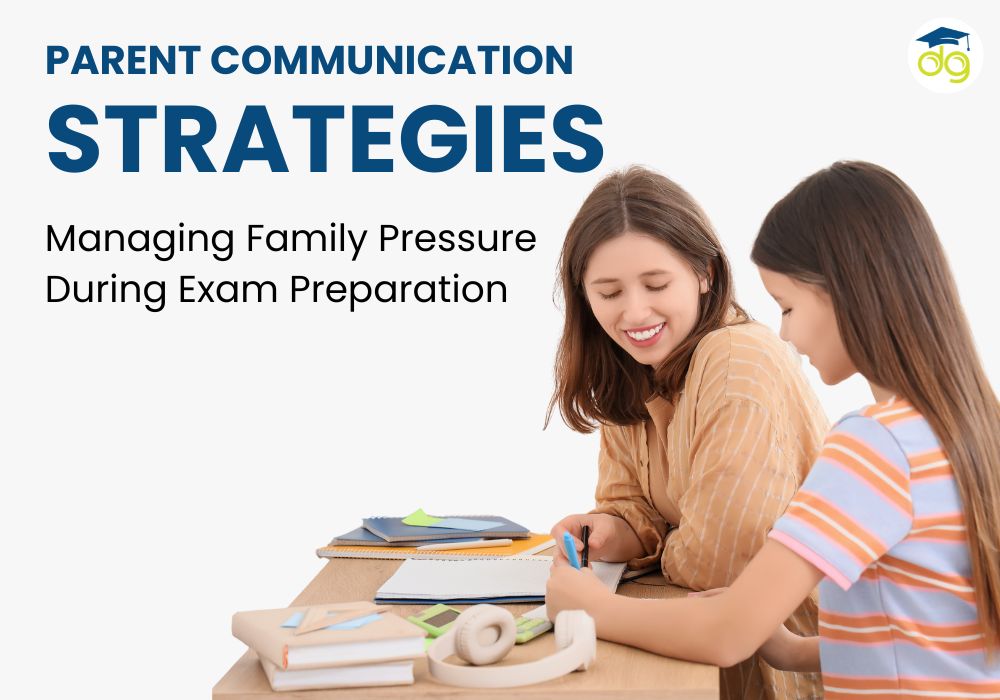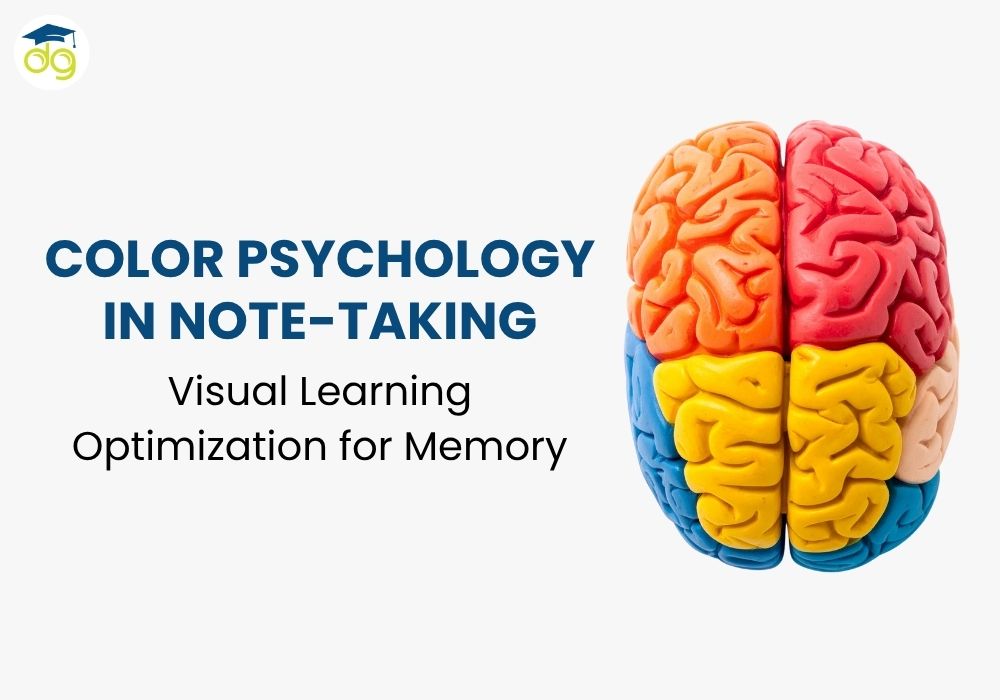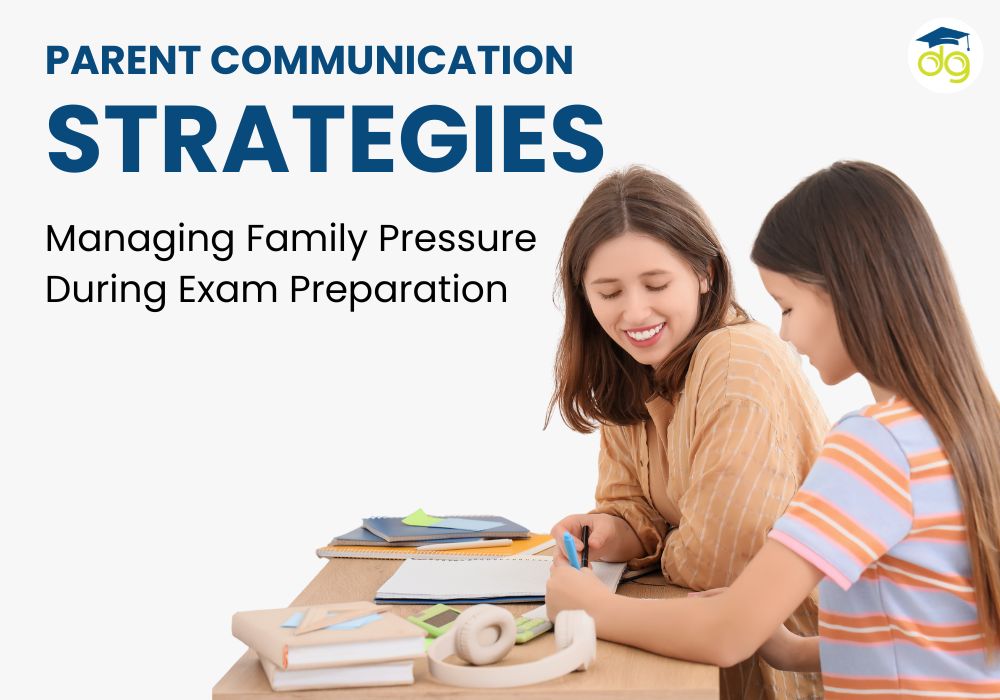Parent Communication Strategies for Managing Exam Family Pressure
Effective Parent-Teacher Support to Reduce CBSE Exam Stress
The time of the year for exams is among the most stressful times for parents and students. Every parent hopes for your child's accomplishment but the manner in which support is expressed can determine the final outcome. Insufficiency of expectations, rigid evaluations and frequent warnings may unintentionally cause anxiety. Thus, efficient parent communication strategies are vital to maintain the balance of the need to motivate and well-being.
Within the framework of CBSE exam preparation guidance, Parents are essential and not just for academic supervision but also provide emotional assistance. If they are handled with care the communication between parents and children can turn exam stress into constructive encouragement and to build a solid basis to ensure student academic success and parental support.
The Impact of Family Pressure on Student Performance
Although it is usually good-hearted, could have devastating effects on the performance of a child. Research shows that children with high expectations but no the emotional support are more prone to be afflicted by anxiety, insomnia as well as a decreased level of concentration.
Students under pressure can:
- Find it difficult to keep focused
- Be afraid of failure
- Develop negative self-talk
- Be wary of open communication between teachers and parents
Therefore, managing family pressure during exams can be a shared burden that parents and teachers share. Recognizing the emotional limitations of children and creating a safe environment for trust is the first step towards better outcomes in learning.
Why Communication Matters During Exams
Parents' communication directly impacts the mindset of a child. Empathetic and positive communication is able to turn anxiety into confidence. However, harsh words or continuous criticism may cause self-esteem to be damaged.
Effective communication requires:
- The ability to listen without judgment
- Inquiring about open-ended issues
- Inspiring effort, rather than just focusing on markings
- Reassurance and compassion
A strong communication system bridges the emotional gap between children and parents. If families engage in open discussion, academic excellence and parental involvement promote development and wellbeing.
How Parents Can Reduce Stress for Students During CBSE Exams
The influence of parents is often overlooked on their child's mood when they are studying. An orderly and peaceful living space can boost concentration and self-confidence. Below are a few easy methods parents can reduce stress for students during CBSE exams:
Strategy | Description | Benefit |
| Make your home a tranquil setting | Be mindful of distractions, noise, and arguments in the study room. | Enhances focus and calmness. |
| Avoid comparison | Avoid comparing your child with friends or relatives. | Develops self-confidence and confidence. |
| Encourage relaxation | Make time for leisure such as music, shorter walks. | Reduces the risk of burnout and increases retention. |
| Set achievable targets | Split large portions into smaller daily tasks. | Improves consistency and decreases the amount of overwhelm. |
| Praise effort | Recognition of hard work. Not just the results. | Encourages students to continue their improvement. |
Simple gestures of empathy can go a long way to helping to reduce anxiety during exams. Parents need to be aware that a stable emotional state is just as crucial as academic readiness.
Teaching Techniques for Students Under Family Pressure
Teachers also play an important part in helping students have to deal with anxiety in their homes. Through implementing mindful methods of teaching teachers can reduce anxiety and increase confidence.
A few teaching techniques for students under family pressure are:
- Personal mentorship: Offering short counseling sessions that check your emotional wellbeing.
- Collaborative Learning: Promoting group discussion for teamwork rather than competing.
- Meditation activities: Integrating short meditation or breathing exercises during classes.
- Positive feedback: Highlighting the progress of your work rather than criticizing the weaknesses.
These methods not only aid in CBSE exam preparation guidance however they teach important mental coping techniques that can allow students to thrive for the future.
Strengthening Parent-Teacher Communication During Exams
In the event that teachers and parents cooperate and the child benefits from consistent instruction. A regular communication process ensures that both parties are aware of the child's strengths, needs and the challenges.
Methods for maintaining effective communication between parents and teachers during exam season are:
- Parents-teachers' meetings are a regular feature (in-person or online)
- Updates on progress via apps for schools or via emails
- Group discussions on academic issues
- Making observations about behavior and emotions
The collaborative model helps to increase student academic success and parental support, helps students feel from home as well as in school.
Life Skills for Students to Handle Exam Stress at Home
Exams require more than understanding; they test the students' resilience and time management. Parents can help children develop through teaching fundamental life skills for students to handle exam stress at home.
This includes:
- Time management: Utilizing planners or applications to make study schedules.
- Healthy lifestyles: Ensuring proper sleep water, nutrition, and sleep.
- Expression of emotion: Promoting open discussions regarding doubts, fears and anxieties.
- Meditation: Practicing deep breathing or gentle yoga exercises to soothe your nerves.
- Positive Thinking: Replacing negative self-talk by affirmations that build confidence.
Once these skills are an element of daily life for children, exams are less daunting and become more of an opportunity to improve yourself.
The Role of Value-Based and Holistic Education
Modern education is more than just academics. It focuses on value-based education and student well-being, in which compassion, empathy and respect are given the same significance as grades and marks. Parents can help by demonstrating moral values and behaviour at home.
Important features of holistic education for senior secondary students comprise:
- Emotional intelligence development
- Mental clarity and physical health
- Social responsibility
- Use of technology in a balanced way
- Communication with family members and moral education
Such an approach ensures that students grow into emotionally strong, responsible, and compassionate individuals--qualities far more valuable than grades alone.
Creating a Supportive Environment at Home
The home is where the classroom begins as parents are the primary teachers. An environment that is positive at home boosts students' confidence and ability to concentrate on exams.
Easy steps to build the home environment that supports you include:
- Making sure discussions on exams are real and in a calm manner
- Promoting a balanced life through relaxation, rest and revising
- Distinguishing negative behavior or conflicts in the environment around the child
- Celebration of effort and improvements
In keeping peace and a sense of empathy within the family, parents help create the sense of safety which encourages kids to do better in school.
Encouraging Parent Awareness and Guidance Programs
A lot of schools have started to organize online or in-person workshops for parents in order to increase parent communication strategies and awareness of anxiety during exams. They help parents recognize the early indicators of anxiety and also learn about the latest parenting methods.
They typically include:
- Management of their emotions for parents and students
- Understanding the psychology of adolescents
- Resilience and motivation
- Refraining from negative reinforcement and comparing
With the programs offered, parents are able to take on the role of a partner in their child's learning journey, instead of being pressure-inducing sources.
Real-Life Success Story: Collaborative Exam Support
In a CBSE school located in Delhi there was a "Mindful Exams program" launched to educate parents on stress-free communication methods. Teachers led mindfulness classes as parents sat through sessions on motivation and empathy.
What did it mean? students reported better focus levels and fewer complaints about anxiety and higher exam scores. This project demonstrated that academic excellence and parental involvement are possible through proper communication strategies.
Conclusion
The pressure of exams is unavoidable, however, its effect is contingent on how the pressure is handled. If teachers, parents, as well as students are open with each other the exam prep becomes an adventure of learning without fear.
The fundamentals of parent communication strategies are compassion, understanding and encouraging. When parents are mindful and use the positive influence of reinforcements, parents could turn stress from exams into the opportunity to grow.
The modern world of education is not only focused on marks. It's about cultivating well-balanced, confident and emotionally intelligent students who are prepared to take on the challenges of life. If parents implement these methods, student academic success and parental support are in sync to establish a strong base for the future.
For more insights on effective parenting, teacher collaboration, and emotional wellness during exams, visit SkoodosBridge.
Empowering parents, educators, and students--SkoodosBridge connects families with expert academic mentors and mental wellness resources designed to make exam preparation a balanced and successful experience.
FAQs
1. How can parents help reduce exam stress at home?
It's by maintaining the environment calm, ensuring the openness of communication and rewarding the effort rather than looking at the results.
2. Why is communication important between parents and teachers during exams?
It helps ensure an ongoing academic and emotional care for children from the school and home.
3. What are effective parent communication strategies during exam preparation?
Listening with empathy, promoting efforts, setting achievable goals as well as maintaining a positive and constructive conversation.
4. How can teachers help students under family pressure?
Through mindfulness practices as well as mentorship programs, in creating a supportive classroom.
5. What is the best way to manage family pressure during exams?
Balancing expectations with empathy--understanding that emotional well-being is the key to better performance.
Categories
Archives
Similar Posts

Parent Communication Strategies for Managing Exam Family Pressure
by Skoodos Bridge

Time Zone Study Scheduling for Indian Students in Global Coaching
by Skoodos Bridge

Budget Breakdown: Cost Analysis of Top JEE Coaching Institutes 2025
by Skoodos Bridge

Color Psychology in Note-Taking for Better Memory and Learning
by Skoodos Bridge

Mirror Neurons and Group Study: The Psychology Behind Collaborative Learning
by Skoodos Bridge

Music Therapy for Concentration: Playlists to Boost Focus While Studying
by Skoodos Bridge

Dopamine Hacking for Study Motivation: Neuroscience-Based Exam Prep
by Skoodos Bridge

Electric Vehicle Jobs: Top Mechanical Engineering Careers in EV Sector
by Skoodos Bridge

EdTech Careers After Engineering: Build Learning Apps & Startups
by Skoodos Bridge


Leave a Comment